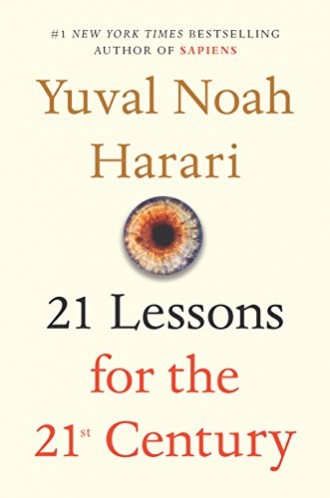21 Lessons for the 21st Century

from amazon.com
How do computers and robots change the meaning of being human? How do we deal with the epidemic of fake news? Are nations and religions still relevant? What should we teach our children?
Yuval Noah Harari’s 21 Lessons for the 21st Century is a probing and visionary investigation into today’s most urgent issues as we move into the uncharted territory of the future. As technology advances faster than our understanding of it, hacking becomes a tactic of war, and the world feels more polarized than ever, Harari addresses the challenge of navigating life in the face of constant and disorienting change and raises the important questions we need to ask ourselves in order to survive.
In twenty-one accessible chapters that are both provocative and profound, Harari builds on the ideas explored in his previous books, untangling political, technological, social, and existential issues and offering advice on how to prepare for a very different future from the world we now live in: How can we retain freedom of choice when Big Data is watching us? What will the future workforce look like, and how should we ready ourselves for it? How should we deal with the threat of terrorism? Why is liberal democracy in crisis?
Harari’s unique ability to make sense of where we have come from and where we are going has captured the imaginations of millions of readers. Here he invites us to consider values, meaning, and personal engagement in a world full of noise and uncertainty. When we are deluged with irrelevant information, clarity is power. Presenting complex contemporary challenges clearly and accessibly, 21 Lessons for the 21st Century is essential reading.
Author: Yuval Noah Harari

Prof. Yuval Noah Harari is a historian, philosopher and the bestselling author. Born in Haifa, Israel, in 1976, Harari received his PhD from the University of Oxford in 2002, and is currently a lecturer at the Department of History, the Hebrew University of Jerusalem.
Prof. Harari lectures around the world on the topics explored in his books and articles, and has written for publications such as The Guardian, Financial Times, The New York Times, The Times, The Economist and Nature magazine. He also offers his knowledge and time to various organizations and audiences on a voluntary basis
Reviewed by: John Stokdijk

The first two books written by Yuval Noah Harari which became bestsellers caught my attention but I never read them. However, recently my mind has been more focused on the big changes taking place in the world and I was eager to learn what this exciting new thinker on the scene had to say. 21 Lessons for the 21st Century did not disappoint.
I had already come to the same conclusion that Harari states in his Introduction. The world order that developed soon after WWII has delivered much progress during the past seventy years. But it now seems inadequate for the challenges of the present time.
At the close of the twentieth century it appeared that the great ideological battles between fascism, communism, and liberalism had resulted in the overwhelming victory of liberalism. Democratic politics, human rights, and free-market capitalism seemed destined to conquer the entire world. But as usual, history took an unexpected turn, and after fascism and communism collapsed, now liberalism is in trouble.
I think that Harari’s statement introducing Part l his book is one of the most important and under-reported trends in the world today, a trend that I was slow to pick up on.
Humankind is losing faith in the liberal story that dominated global politics in recent decades… But liberalism has no obvious answers to the biggest problems we face… perhaps the time has come to make a clean break with the past and craft a completely new story.
Until the last few years, I thought incremental progress within the established framework was the best path forward. Now for the first time in my life I see the need for a new way but I have no idea what that might be. I am not confident that something positive will emerge during the remainder of my life, but I hope that I am wrong.
In Chapter two, Harari uses a phrase I have never heard before, a haunting phrase that I cannot get out of my head.
Some believe that within a mere decade or two, billions of people will become economically redundant.
...we might nevertheless witness the rise of a new useless class… no remaining human job will ever be safe from the threat of future automation… it is far from clear that billions of people would be able to repeatedly reinvent themselves without losing their mental balance… People will feel that the system is rigged against them...
I am very grateful that I was born in 1951 and that I entered the workforce at a time of great optimism for a better future for most people. There was no talk of a useless class then. I do remember the talk of a “leisure society” and my disappointment when it did not materialize.
I have little disagreement with most of what Harai writes in this book, but I disagree with him on the matter of free will. The consequences of my disagreement are significant but outside of the scope of this report. In defense of Harari, there is no consensus amongst experts on the question of free will.
Along with Harari, many people have a feeling that something is seriously wrong with the world today.
...how do you regulate the ownership of data? This may well be the most important political question of our era. If we cannot answer this question soon, our sociopolitical system might collapse. People are already sensing the coming cataclysm.
Perhaps Harari puts too much emphasis on the impact of Big Data. But if a mighty contest between Big Corporations and Big Government develops over Big Data, it seems unlikely to me that ordinary people will understand the issues, or care. Personally, it does irritate me that Google, Facebook and others harvest my data for profit.
...as of 2018 we are still Stone Age animals. In order to flourish we still need to ground ourselves in intimate communities… if we don’t belong to any intimate community, we humans feel lonely and alienated ...it is extremely difficult to know each other as “whole” people.
I am part of a wonderful community of expats living in Mexico. But even so, I do not feel part of an intimate community of like-minded people. I have made a start at developing such a group here.
Though humankind is very far from constituting a harmonious community, we are all members of a single rowdy global civilization.
This is an interesting contrast with the “clash of civilizations” idea.
It was extremely difficult to construct the internationalist regime that prevented nuclear war and safeguarded global peace… abandoning this regime altogether and reverting to nationalist power politics would be an irresponsible gamble.
Nationalist isolationism is probably even more dangerous in the context of climate change than nuclear war.
The idea that we are first citizens of the world before we are citizens of countries has long resonated with me. Societal issues can be local, regional, continental or global. Ideally, governance would be structured to align with the geography of issues. In my opinion, the idea of a global governance authority to deal with global issues makes a lot of sense. Unfortunately, discussion of world government occurs mostly in the realm of conspiracy theories.
The global issues of immigration are discussed everywhere, mostly in a polarized setting with heated emotions. Harari provides an excellent framework for positive dialogue. Chapter 9 should be required reading for every politician.
And every politician should heed the words at the start of Part lll:
Though the challenges are unprecedented, and though the disagreements are intense, humankind can rise to the occasion if we keep our fears under control and be a bit more humble about our views.
One potential remedy for human stupidity is a dose of humility… How can we make nations, religions, and cultures a bit more realistic and modest about their true place in the world?
To acknowledge the great mysteries, to face uncertainties and the limits of our individual and collective knowledge, this is the path to humility.
I personally never cease to wonder about the mystery of existence.
But then Harari’s humility leaves him and he makes a rather arrogant claim.
Secularism can provide us with all the values we need.
Every religion, ideology, and creed has its shadow, and no matter which creed you follow you should acknowledge your shadow…
From a good friend at Lakeside, I have gained some appreciation for the idea of our individual and collective shadows. I now realize that our retirement years are our last opportunity to dance with our shadow. I wonder what the collective shadows of a secular culture are.
The unexpected ascension of Trump and the Brexit decision did confuse me for a while and I take some comfort in the wise words of Yuval Noah Harari.
If you feel overwhelmed and confused by the global predicament, you are on the right track. Global processes have become too complicated for any single person to understand.
In the coming decades, the world will become even more complex than it is today… the best we can do under such conditions is to acknowledge our own individual ignorance.
When I was much younger I thought I knew all the important truths because God had revealed them to people who taught them to me. Only in recent years have I realized how very incomplete my knowledge, and everyone’s, is. I still love to learn but I am at peace with my ignorance, at least most of the time.
In Chapter 17, Harari equates religion with fake news and he knows he will offend many. The fiction of religion was once my primary guide. But I am not in the camp of those who believe religion is always harmful and cannot possibly be a useful fiction.
He also mentions the fictions created by corporations and uses Coca-Cola as an example. I live in Mexico where many people believe that drinking lots of Coke is not harmful. Consequently, there is an epidemic of obesity here and a high death rate from diabetes.
...our belief in the modern mythology of capitalism is underpinned by the artistic creations of Hollywood and the pop industry.
In recent years, I have learned that many Millenials, unlike most Baby Boomers, do not believe the myth of capitalism.
I easily understand my life as a story, a story to be told.
In almost all cases, when people ask about the meaning of life, they expect to be told a story. Homo sapiens is a storytelling animal that thinks in stories… All stories are incomplete. Yet in order to construct a viable identity for myself and give meaning to my life, I don’t really need a complete story devoid of blind spots and internal contradictions. To give meaning to my life, a story needs to satisfy just two conditions. First, it must give me some role to play… Second, whereas a good story need not extend to infinity, it must extend beyond my horizons.
The last chapter of 21 Lessons for the 21st Century, Meditation, is controversial. Some find it trite and some find it profound. But no one knows the life of Yuval Noah Harari better than Yuval Noah Harari.
Since that first course in 2000, I began meditating for two hours every day, and each year I take a long meditation retreat of a month or two. It is not an escape from reality. It is getting in touch with reality…Without the focus and clarity provided by this practice, I could not have written Sapiens or Homo Deus.
Harari ends his book once again focused on mystery.
Many people, including many scientists, tend to confuse the mind with the brain, but they are really very different things… The mind is a flow of subjective experiences, such as pain, pleasure, anger, and love… so far we have absolutely no explanation for how the mind emerges from the brain.
...consciousness is the greatest mystery in the universe…
Comments
6 years ago — Karl HomannThanks, John. Very insightful from a personal perspective, and in close alignment with my own view of the book and Harari's world view. We had better pay attention.
6 years ago — John StokdijkI have prepare a lengthy summary and commentary available at https://drive.google.com/file/d/1LTfXRCKgpM0QA3mtIl-fK0ZTd2mHrqnL/view?usp=sharing.
Reviewed by: Karl Homann

YUVAL NOAH HARARI
In July, we will be reading a fascinating, intellectually challenging, and, to some, perhaps disturbing book by Yuval Noah Harari, professor of history at the Hebrew University of Jerusalem, entitled 21 Lessons for the 21st Century (2018).
While the content of Harari’s books is challenging, he has the gift of making complex concepts and ideas accessible through his style of writing.
21 Lessons was preceded by two, equally challenging books: Homo Sapiens: A Brief History of Humankind (2014) and Homo Deus: A Brief History of Tomorrow (2016).
Harari’s three books could be considered a “trilogy”. In fact, Harari himself often refers in his later books to one or the other preceding one.
In simplified terms, Homo Sapiens traces the history of our species’ struggle for survival in the animal world after we stepped outside our caves.
Homo Sapiens not only survived as animal species for 70,000 years, but also succeeded in overcoming epidemics, wars, revolutions, social, political and economic changes and upheavals, not because we were particularly adapted at survival – many animals are much better at it than we are – nor because we were or are more intelligent – at 1550 cubic cm, Homo Neanderthalensis had an equally big or even bigger cranial capacity and brain than Sapiens.
No, what took us to the apex of the animal world was not our extraordinary survival skill, though honed throughout an evolution of 300,000 years, nor our extraordinary intelligence, but according to Harari, our capacity to cooperate with each other in a disciplined and yet flexible manner and in great numbers.
In an interview on Intelligence Squared, the world's leading forum for debate, Harari traces the path towards his first book (Sapiens) and the ones that follow by saying that his books are largely based on the questions that people kept asking as a result of his conferences and lectures, mainly about the future of humankind in the age of Artificial Intelligence (AI) and of Big Data that is coming at us.
At the dawn of the third millennium, humanity wakes up, stretching its limbs and rubbing its eyes. Remnants of some awful nightmare are still drifting across its mind. ‘There was something with barbed wire, and huge mushroom clouds. Oh well, it was just a bad dream.’ Going to the bathroom, humanity washes its face, examines its wrinkles in the mirror, makes a cup of coffee and opens the diary. ‘Let’s see what’s on the agenda today.’
If the oxymoron of the subtitle “A Brief History of Tomorrow” does not catch a reader´s attention, the quoted section from the beginning of the Homo Deus above certainly should.
Because of our successes in the past few decades, or even a century, in solving illnesses, eradicating plagues, reining in famine, lowering the occurrence of wars, we have come to believe that we are the “gods” (“deus”, god) of the animal world. And when there were failures, we just shrugged them off as the consequence of an imperfect world, or that it was “God’s will”, or that somebody just screwed up. Nevertheless, even in our struggle against AIDS and Ebola, “the scales are tipping in our favour.
So, having achieved today what humanity has over the last century, what’s “next on the agenda” for tomorrow?
Homo Deus deals with humanity’s attempts at achieving happiness, immortality, even “divinity”… and forms the basis for 21 Lessons for the 21st Century, in which the outhor tells us:
Wake up, Humanity! What’s coming down the pipe at you is beyond your current state of affairs and needs your full attention. Not much of what you know today will be the same tomorrow. In fact, you may not be what you are today. Much of what you know today is fiction, stories you have been telling each other about politics, religions, countries, even money.
Humanism, individuality, and liberal democracy may come to an end… and will be replaced by Dig Data and the Religion of Technology and Artificial Intelligence. Harari’s observations and claims are not predictions or prophecies, but possibilities based on what already exists today.
Jobs and professions as life-long occupations will disappear. People may have to reinvent themselves every ten or so years: at 20, at 30, 40, and 50, something that will not be easy at 60, 70, 80 or 90. And those who cannot adapt may become useless, even superfluous.
HARARI: We all (people, workers, government leaders, business owners) need more FREE time to read, think and meditate on how to deal with the changes and challenges that are facing us in the next 20 or 30 years.
Dr. Harari himself meditates each day for two hours.
HARARI: We are now “hackable” human beings.
How does Amazon.com “know” what books you like to read and sends you a list of books “Recommended for YOU”? Through algorithms, that’s how.
HARARI: We will soon – perhaps as soon as 2050 - be cyborgs*, governed by algorithms* outside ourselves.
* A cyborg, short for "cybernetic organism", is a being with both organic and biomechatronic body parts. The term was coined in 1960.
*Algorithsms will understand us better than we do ourselves and press our emotional buttons..
****
HARARI, 21 LESSONS FOR THE 21ST CENTURY
[Our world] is structured in such a way that those who make no effort to know can remain in blissful ignorance (“willful ignorance”), and those who do make an effort will find it very difficult to discover the truth.
However, in a world in which everything is interconnected (even interdependent), the supreme moral imperative becomes the imperative to KNOWAnd, even if we truly want to know, most of us are no longer capable of understanding the major moral problems of the world.
So, up to now, we did a number of things:
1. We downsized the issue. (Oh, it´s not that bad.)
2. We weaved conspiracy theories. (The Russians did it.)
3. We created a dogma (or myth) – religious or political -, and put our trust in some allegedly all-knowing theory, ideology, institution, chief or god.
DENIALISM is rampant. Denialism is different from denial. When an alcoholic is in denial, that means he or she really believes that there is no problem. Denialism on the other hand reflects the attitude of a person towards something that does exist, and he or she knows that is real, but because the person does not like the reality or true complexity of the world, he or she goes into the three-monkey mode: he puts his hands over his ears, eyes and mouth.
If I do not look, hear, or talk about it, it does not exist.
So, have we then officially entered the “post-truth” era?
Does some fake news last forever?
****
I have added a number of YouTube links of Harari interviews and lectures in which he explains further what he writes. Some of them lasts more than an hour (see duration after the title). I consider the video with Thomas Friedman and Yuval Noah Harari the most revealing and, at he same time, the most challenging.
HARARI INTERVIEWS, LECTURES, and DEBATES
Website
https://www.ynharari.com/category/video/
Why humans run the world | Yuval Noah Harari (TED 17:09)
https://www.youtube.com/watch?v=nzj7Wg4DAbs
How Sapiens Conquered the World - Yuval Harari, at USI (35:23)
https://www.youtube.com/watch?v=b5_W2ecr0r4
Yuval Noah Harari on the Rise of Homo Deus (1:31:18) Intelligence Squared — Join the Debate
https://www.youtube.com/watch?v=JJ1yS9JIJKs
The 2 Most Important Skills For the Rest Of Your Life | Yuval Noah Harari on Impact Theory (41:01)
The 2 Most Important Skills For the Rest Of Your Life | Yuval Noah Harari on Impact Theory (41:01)
https://www.youtube.com/watch?v=x6tMLAjPVyo
Bananas in Heaven – Yuval Noah Harari – TEDxJaffa/UK Science & Innovation Network, Oct. 2014 (Homo Sapiens) – 15:18
https://www.youtube.com/watch?v=XyqNhfjxcUc
Times Talks | Yuval Noah Harari (NYT) – 1:11:27
https://www.youtube.com/watch?v=Vxvb7Nw9JCE
Future of Humankind with Yuval Harari (6:45)
https://www.youtube.com/watch?v=aVwGH1oznZ4
The Future of Humanity - with Yuval Noah Harari (at the Royal Institute)
https://www.youtube.com/watch?v=XOmQqBX6Dn4
Homo Deus: A Brief History of Tomorrow with Yuval Noah Harari (UCTV 56:36)
https://www.youtube.com/watch?v=4ChHc5jhZxsYuval Harari | Will Technology Help Us Become Immortal? (CBC – 11:52)
https://www.youtube.com/watch?v=XyqNhfjxcUc
10 Questions on the History of Happiness (6:18)
https://www.youtube.com/watch?v=5SEDVzxmXDE&t=30s
Yuval Noah Harari: "21 Lessons for the 21st Century" | Talks at Google (58:48)
https://www.youtube.com/watch?v=Bw9P_ZXWDJU&t=248s
Yuval Noah Harari In Conversation with Christine Lagarde (IMF – 1:00:58)
https://www.youtube.com/watch?v=Bw9P_ZXWDJU
How Thomas Friedman* and Yuval Noah Harari Think About The Future of Humanity - The New York Times Conferences (London – 1:25:31)
https://www.youtube.com/watch?v=5chp-PRYq-w
Comments
6 years ago — Karl Homann
ALGORITHM
Definition:
In mathematics and computer science, an algorithm is a set of instructions, typically to solve a class of problems or perform a computation. Algorithms are unambiguous specifications for performing calculation, data processing, automated reasoning, and other tasks.
History:
The concept of algorithm has existed for centuries. Greek mathematicians used algorithms. The word algorithm itself is derived from the 9th century Persian (Iranian) mathematician Muḥammad ibn Mūsā al-Khwārizmī.
Example: Converting Fahrenheit to Celsius
Problem:
Celsius and Fahrenheit have different zero points – 0 degrees Celsius is 32 degrees Fahrenheit – so we need to subtract 32 from the Fahrenheit temperature. The size of the units is also different. Celsius divides the temperature span between the freezing and boiling points of water into 100 degrees, while Fahrenheit divides this range into 180 degrees, so we need to multiply the value by 5/9 to turn 180 degrees into 100 (5 x 180 = 900/9 = 100).
Solution: algorithm (Think of it as a recipe in computer language.)
#!/usr/bin/env python3
import sys
def convert_f2c(S): """(str): float
Converts a Fahrenheit temperature represented as a string to a Celsius temperature.
""" fahrenheit = float(S)
7. def main(): # If no arguments were given, print a helpful message
8. if len(sys.argv) == print('Usage: {} temp1 temp2 ...'.format(sys.argv[0]))
9. sys.exit(0)
10. # Loop over the arguments for arg in sys.argv[1:]:
11. try: celsius = convert_f2c(arg)
12. except Value Error: print("{!r} is not a numeric value".format(arg), file=sys.stderr)
13. else: print('{}\N{DEGREE SIGN}F = {:g}\N{DEGREE SIGN}C'.format(arg, round(celsius, 0)))
14. f __name__ == '__main__': main()
celsius = (fahrenheit - 32) x 5 / 9*:
80 F – 32 = 48 x 5 = 240 / 9 = 26.7 C
